Hip bursitis pain relief
 Do you have hip pain that affects your daily life? Does it hurt when you are standing, walking, running, or even when you try to go to sleep? You may have been diagnosed with hip bursitis and the only solution given was to rest, take painkillers, take an anti-inflammatory, have a steroid injection, use ice or do hip exercises. Continue reading more about hip bursitis pain relief.
Do you have hip pain that affects your daily life? Does it hurt when you are standing, walking, running, or even when you try to go to sleep? You may have been diagnosed with hip bursitis and the only solution given was to rest, take painkillers, take an anti-inflammatory, have a steroid injection, use ice or do hip exercises. Continue reading more about hip bursitis pain relief.
None of these is a permanent solution for hip bursitis because they don’t tackle the main cause of hip bursitis namely inflammation. I can show you how to get hip bursitis pain relief and get rid of that troublesome hip bursitis pain forever.
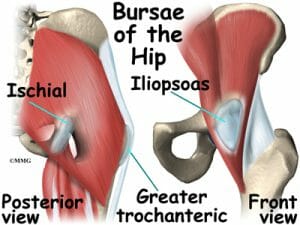 What is bursitis of the hip and why does it happen?
What is bursitis of the hip and why does it happen?
Bursitis of the hip is caused when the bursae (fluid-filled sacs) become inflamed because of overuse leading to tenderness, very painful swelling, and pain daily.
Fluid-filled sacs act as a cushion to your tendons, ligaments, and muscles helping them to move smoothly over the hip bone. When the swelling occurs it affects the area around them and leads to pain and tenderness.
Hip Bursitis is commonplace
Hip bursitis is a commonplace excruciating ailment that affects about 16% of females and 10% of males of all age groups in the USA, the condition tends to affect people more in the middle age to elderly age bracket, but it can affect everyone.
There are many causes the most common cause of hip bursitis is a repetitive activity like walking, running, playing sports when younger, or overuse of the hip joint in your job. Hip bursitis is also known as trochanteric bursitis.
- Hip bursitis is the most common cause of hip pain.
- Trochanteric bursitis regularly accounts for outer hip tenderness
- Ischial bursitis may be the cause of a type of dull pain in the upper buttock region.
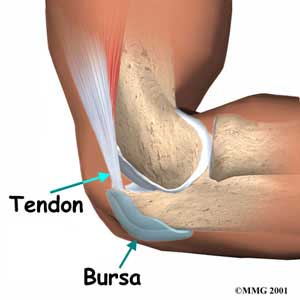 Does bursitis happen only in the hip?
Does bursitis happen only in the hip?
The answer is no, bursitis can also occur in the shoulder, knee, and elbow joints, bursitis can be acute meaning short-lived, the more common bursitis is chronic or long-lasting bursitis.
Hip bursitis is quite common in athletes because of the repetitive running action puts pressure on the cartilage surrounding the hip, it eventually wears the cartilage down causing inflammation swelling, and pain.
The condition may also be caused by unnatural walking caused by unequal leg length, other reasons are arthritis of the back, hip, or knee.
Other causes of hip bursitis
- Repetitive overuse or stress on the hip
- Hip injury
- Gout
- Fake gout
- Rheumatoid arthritis
- Diabetes
- Bacterial infection, like Staphylococcus aureus
- Bony growth on the hip (bone spurs)
- Spinal issues like scoliosis
- Bad posture
- Weakness in the muscle
- A fall on the hip
- Hip replacement or surgery
- Psoriasis or thyroid disease
- Bursae irritation caused by muscles or tendons
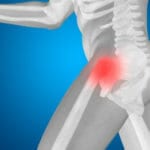 Bursitis of the hip symptoms
Bursitis of the hip symptoms
If you notice the following symptoms over an extended period you may need to get a diagnosis to rule out other reasons, chances are if you have any of these you have hip bursitis:
- Joint pain and tenderness
- Swelling and warmth around the affected area.
- Sharp pain in the first few days
- Dull or achy pain after that
- Pain is more noticeable when getting into a chair or a bed.
- Noticeable pain after sitting down for a while
- Noticeable pain if you have been standing in the same position for more than 15 minutes.
- Noticeable pain when climbing stairs
- Noticeably pain when going to sleep on the affected side.
Acute v Chronic Bursitis
Acute bursitis can usually flare up over hours or days. Chronic bursitis can go on for a few days to a few weeks or even longer. Chronic bursitis can fade away and return some time later.
Acute bursitis can change into chronic bursitis if it returns or if a hip injury happens.
Over time the bursa may become thicker leading to an increase in swelling, this will inhibit movement and weaken the muscles (atrophy) in the affected area.
Hip bursitis diagnosis
A hip bursitis diagnosis is relatively straightforward and involves a physical examination by your doctor, you will be asked about your symptoms and how long you have had the hip pain.
You may be referred to a hospital consultant for further tests such as an X-ray or MRI (magnetic resonance imaging) to cancel out other conditions with similar symptoms.
What can you do to prevent or avoid hip bursitis?
As discussed earlier the most common cause of hip bursitis is overuse of the hip muscle for example during exercise (we know that exercise is good for you) try not to walk for too long at any one time (about one-hour max) take a break to preserve the hip muscles.
Try to avoid activities that are especially demanding or painful to do. When you are younger it won’t cost you a thought to do these activities but trust me as you age all that physical activity can have its effect on your hips.
Always warm up before exercising, and do your stretches to prevent any muscle tear or pull, and if you are a little overweight try to eat less and exercise more, this will help keep the pressure off your hips.
What does hip bursitis feel like?
If you have hip bursitis, you may endure:
- Constant pain on the outside of the hip, down the leg as far as the knee, and pain in the buttock.
- Hip pain when you press on the affected hip with your fingers.
- Pain while lying on the troubled hip.
- Hip or leg pain climbing a stair.
- Pain that gets worse when you try to get up after sitting down
- Hip pain while walking or else running.
- Hip pain when lifting the leg sideways.
- Hip and leg pain when standing in one spot for more than 10 minutes
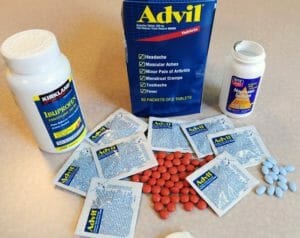 Treatments for Hip bursitis
Treatments for Hip bursitis
When you visit your doctor and the diagnosis is hip bursitis you may be told to take some time out and rest the affected hip and leg.
To reduce the swelling and kill the pain you may be prescribed a course of anti-inflammatory drugs known as NSAIDs.
Drugs such as the big brand names ibuprofen, Motrin, naproxen or Advil, in some cases an ice-pack will help to reduce swelling, obviously, during this period, it isn’t advisable to do any form of exercising which could make the symptoms worse.
Once the pain has receded your doctor may suggest some light exercises to prevent muscular wastage, you could ask your doctor for some recommended exercises to build up strength in the hip muscle area.
If you have chronic bursitis you may find that your ability to function in a normal way may be hindered. Should this be the case you may need some type of physical therapy to help with your mobility.
If these treatments don’t work
If these treatments have been tried and you are still in constant pain the surgeon may need to take fluid from your bursa, or your doctor may give you a steroid with a needle in a further effort to reduce the swelling and get rid of the pain.
These are normally quite effective, but the pain will come back after about three months and you will need another injection then.
When all other treatments have failed, as a last resort surgery is used to treat hip bursitis. It is a relatively simple procedure the surgeon removes the affected bursa from the hip.
The hip can function to a certain degree but not as good as if the normal bursa was there, remember the bursa helps with the smooth movement of the hip.
Serrapeptase does work for hip bursitis pain relief!
I know from my own experience that this little tablet will get rid of your hip bursitis pain by tackling the inflammation that caused the swelling and pain, you can read my hip bursitis story here.
What can you do to minimize hip bursitis pain?
The best advice if you have chronic hip bursitis, seek to reduce flare-ups by doing hip stretching exercises every day to increase your mobility.
If you experience a flare-up don’t forget that resting the hip is most important otherwise the swelling and pain will take that much longer to improve.
Watch Video
Related Articles:
Natural hip bursitis pain relief



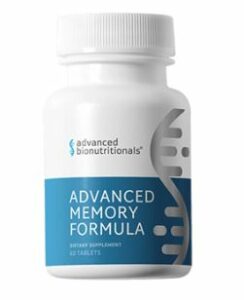

Leave a Reply
Leave a reply here